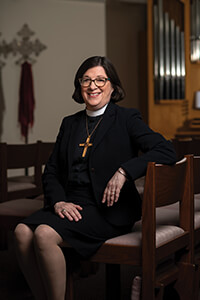The way back to our center
April 7, 2022
587 B.C.E. was not a good year. The siege of Jerusalem ended with the destruction of the city, its walls and Solomon’s temple. Many died of starvation during the siege. The Babylonians, at the direction of King Nebuchadnezzar II, brutally removed the population of Jerusalem to exile in Babylon.
For three generations Judah lived in exile. Babylon was powerful. Babylon was wealthy. And Babylon was cruel. We hear in Psalm 137:1-3: “By the rivers of Babylon—there we sat down and there we wept when we remembered Zion. On the willows there we hung up our harps. For there our captors asked us for songs, and our tormentors asked for mirth, saying, ‘Sing us one of the songs of Zion!’”
With the temple and Jerusalem destroyed, the identity of the people of God was shaken. Who were they now? Where was the Lord now? This was more than a political, military or economic crisis. This was an existential crisis.
The prophets Isaiah, Jeremiah and Ezekiel took this head on. This exile wasn’t about the faithlessness of the Lord. Quite the contrary, it was a demonstration of the Lord’s unwavering faithfulness, compassion and fierce love. The people and leadership of Judah had trusted in their own agency quite apart from depending on the Lord, as humankind too often does to terrible consequences.
So there in Babylon, the people carved out a life for themselves while remaining faithful and resisting assimilation. The Torah, the living word of the Lord, held them together. The prophets, through chastisement and comfort, gave hope. And, I imagine, they often thought of home—the beauty of Jerusalem and the majesty of the temple.
This was more than a political, military or economic crisis. This was an existential crisis.
My cousins and I spent a good part of our childhood with my maternal grandparents. They were both immigrants from Transylvania and, with much hard work, built a life, raised a family and founded our family’s beer distributorship. Our grandparents’ house seemed palatial. The living room ceiling was two stories high, and each year there was the most amazing Christmas tree. Often, I go over every corner of that house in my memory, and I long for it. It was a shock when I drove past that house a few years ago and saw how small it was.
Back to Babylon. A new power arose in the region. Cyrus, king of Persia, defeated Babylon and decreed that the people of Judah should return home and rebuild the walls of Jerusalem. Nehemiah gives the account. In 52 days, withstanding violent plots by enemies, the walls were rebuilt. And then the people gathered to hear the Torah.
I was surprised to hear that they wept. Why? Some say that when hearing the Torah they were grieved by their disobedience. I think it is much more than that. Not everyone came back to Jerusalem. The city of their memory was destroyed. It wasn’t grand anymore. They were utterly spent from repairing the walls. There was exhaustion, relief, grief and hope. Their long years in exile imagining the return to Jerusalem were not met with reality.
We have been in this pandemic for two years. We have been longing for the “Before Times” that in our imagination seem as magical as my grandparents’ house. The return to a post-pandemic world, like the return of circulation, is initially painful. We will need to rebuild those structures necessary for a healthy society—compassion, respect, sacrifice for the greater good, the celebration of diversity, justice.
And we will need the word of the Lord—the Word that calls us back to our center, which is the steadfast love of God, law and gospel, judgment and promise.
We will weep with exhaustion, relief, grief and hope. And there, drawn by God who is our center, we will find each other again.


